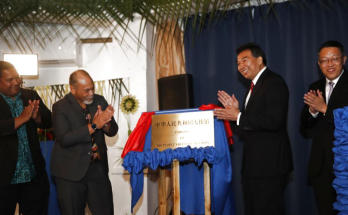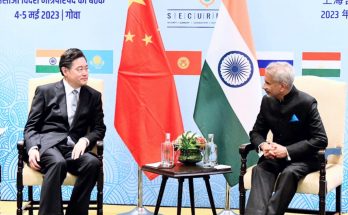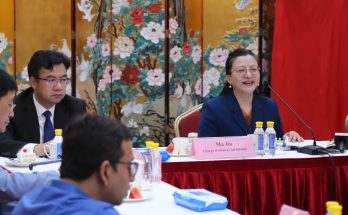 BEIJING: Amid speculation about a more hawkish stance on ties with Beijing by a likely BJP-led government in New Delhi, China has voiced confidence that promoting the India-China friendship “is a shared consensus of all political parties in India.”
BEIJING: Amid speculation about a more hawkish stance on ties with Beijing by a likely BJP-led government in New Delhi, China has voiced confidence that promoting the India-China friendship “is a shared consensus of all political parties in India.”
“So I am confident that whichever party comes to power in India it will stay committed to friendship and cooperation between the two countries,” said Chinese Vice Foreign Minister Liu Zhenmin in Beijing.
Liu held wide-ranging talks with India’s Foreign Secretary Sujatha Singh April 14 at the Diaoyutai State guesthouse in Beijing and underlined the resolve of the Chinese leadership to pursue robust all-round relations with India. The two top diplomats held the sixth annual strategic dialogue for around five hours and firmed up a roadmap of high-level political engagements in the new few months, which will be hopefully followed by the next government in New Delhi.
Singh’s visit to Beijing amid the election fever in India has been seen by China’s diplomatic establishment as a signal by New Delhi to retain the momentum in bilateral relations. “I wish to mention in particular that India is undergoing a very important election. Therefore, you (Sujatha Singh) have chosen to come to China at this very special time to have this strategic dialogue with us. This shows the tremendous importance that the Indian government attaches to this bilateral relationship and we highly appreciate that,” said Liu.
Outlining the widening canvas of the evolving India-China relationship, the Chinese diplomat spoke about “three levels of India-China cooperation on the bilateral level, regional level and international level.” “It is a very important bilateral relationship,” he underlined.
Sujatha Singh stressed that the aim of her visit was “to reiterate to the government of China that the government of India attaches the highest priority to India’s relations with China.” She said India was “committed to consolidating our strategic and cooperative partnership for peace and prosperity.”
“The core of our vision is of a good neighbourly relationship based on mutual trust and understanding and where we are sensitive to each other’s concerns and aspirations.”
Modi Factor
The reaffirmation by India and China to sustain the vitality in their bilateral relationship is significant as it comes against the backdrop of concerns among some sections in China’s diplomatic-strategic establishment that bilateral relations could be affected if the right-wing Bharatiya Janata Party (BJP) leads the next government in New Delhi.
In February, Modi, BJP’s prime ministerial candidate, raised hackles in Beijing when he told a rally in Arunachal Pradesh, India’s north-eastern state which is claimed in entirety by Beijing, that China should “leave behind its mindset of expansion.”
The comments provoked trenchant commentary in leading Chinese media platforms like China Daily and Global Times. But there was a surprising restraint as Beijing saw such comments as election posturing rather than an indication of policy. “Future bilateral relations won’t be affected a lot due to changes in leadership. There is no need to exaggerate the significance of Modi’s remarks,” said an article in the influential Global Times. “With India’s election campaign reaching its climax, it’s no surprise candidates and their parties will try to win more attention by showing their brawn in dealing with China, especially over the border dispute,” said the article.
The BJP has traditionally been hawkish in its rhetoric towards Pakistan and China, but had shown statesmanship and political will in improving relations with these countries during the NDA rule in 1999-2004.
The two Asian giants have not allowed the fret and fever of Indian elections to come in the way of sustaining their engagement. They held a string of important talks in the last few months that included the 17th round of boundary talks, followed by the annual defence dialogue.
The sixth edition of India-China Strategic Dialogue in Beijing April 14 will be followed by the meeting between Director-General of Military Operations (DGMOs) of the two countries on April 22. People’s Liberation Army’s Deputy Chief of General Staff (Operations) Lt Gen Qi Jianguo and his Indian counterpart Director General Military Operations Lt Gen PR Kumar are expected to hold talks to firm up plans for a hotline between DGMOs to prevent bilateral relations from being adversely impacted in case of incursions by border troops and to maintain peace on the disputed frontiers, which in New Delhi’s view is a sine qua non for better relations.
In an important gesture to develop greater military trust, India is sending its stealth frigate INS Shivalik to Qingdao to participate in an international fleet review April 23 hosted by the People’s Liberation Army (PLA) to mark the 65th anniversary of its North Sea fleet. Significantly, China has not invited Japan for the review, which has forced the US to boycott this symbolic event against the backdrop of the worsening diplomatic spat between Beijing and Tokyo over a string of disputed islands in the East China Sea.
Author Profile
- India Writes Network (www.indiawrites.org) is an emerging think tank and a media-publishing company focused on international affairs & the India Story. Centre for Global India Insights is the research arm of India Writes Network. To subscribe to India and the World, write to editor@indiawrites.org. A venture of TGII Media Private Limited, a leading media, publishing and consultancy company, IWN has carved a niche for balanced and exhaustive reporting and analysis of international affairs. Eminent personalities, politicians, diplomats, authors, strategy gurus and news-makers have contributed to India Writes Network, as also “India and the World,” a magazine focused on global affairs.
Latest entries
 DiplomacyApril 23, 2024Resetting West Asia, re-booting the world, but not fast enough: T.S. Tirumurti
DiplomacyApril 23, 2024Resetting West Asia, re-booting the world, but not fast enough: T.S. Tirumurti India and the WorldApril 22, 2024India’s G20 Legacy: Mainstreaming Africa, Global South in global agenda
India and the WorldApril 22, 2024India’s G20 Legacy: Mainstreaming Africa, Global South in global agenda DiplomacyApril 10, 2024Diplomat-author Lakshmi Puri pitches for women power at LSR
DiplomacyApril 10, 2024Diplomat-author Lakshmi Puri pitches for women power at LSR India and the WorldApril 6, 2024UN envoy pitches to take India’s solutions to the world stage
India and the WorldApril 6, 2024UN envoy pitches to take India’s solutions to the world stage







